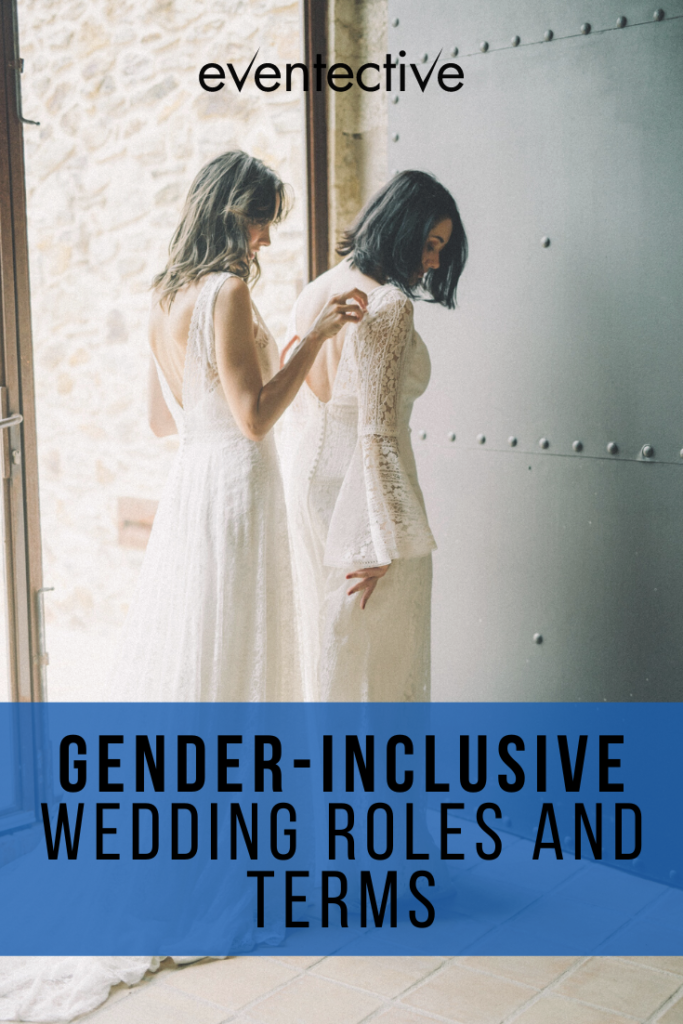
Historically, the wedding industry has always emphasized heterosexual couples–right down to the letters. While bride and groom certainly describe some people who get married, those terms in no way represent everyone. And proper representation is really important at your wedding or the wedding of a close friend or family member. Only with proper representation can the love and celebration be their most authentic. So, in this post, we’re going to offer up some gender-inclusive wedding roles and terms for the big day.
Of course, this isn’t an exhaustive list of terms. And if none of them are right for you, make up your own! The most important part of your wedding is that it reflects you and your partner. (Aside from tying the knot, that is!) Industry standards don’t matter if they’re not true to your relationship. Without further ado, here are some gender-inclusive wedding roles and terms for everyone–including you.
Instead of fiancé or fiancée…
Use: celebrant, marrier, to-be-wed, or nearlywed

It’s a little-known fact that the term fiancé is actually a gendered term–it describes a man who is engaged to be married. Fiancée is the term for an engaged woman. And because the words sound the same, it’s easy to confuse (or forget about) the two. Even still, both terms are gendered. So instead, use gender-neutral terms to describe someone who hasn’t tied the knot–yet.
Instead of any bride term…
Use wedding: wedding dress, wedding party, or wedding shower
On top of being overwhelmingly heterosexual, the wedding industry is also staggeringly bride-centric. Many wedding terms include some form or bride or bridal in their name. For example, it’s common to talk about the bridal party, but there isn’t much mention of a groom party. Thankfully, the fix is simple: replace the term bride with wedding. Now you get to wear a wedding dress or tux alongside your wedding party after celebrating at your wedding shower.
Instead of husband or wife…
Use: partner, spouse, couple, or newlyweds
Like we mentioned earlier, wedding terms predominantly focus on a bride/groom dynamic. And that applies to husband/wife terminology, too. But there are more inclusive words that you can use if husband or wife don’t work for you, like spouse or partner.
You can also swap out the terms in the iconic, “I now pronounce you husband and wife,” declaration, too. Some couples choose to use their married name, so there’s no husband or wife to worry about. But you can also be pronounced married or life partners.
Instead of bridesmaid or groomsman…
Use: wedding attendants, person of honor, best person, wedding party, flower child

Gender-inclusive wedding roles and terms aren’t just necessary for the happy couple. They’re important for members of the wedding party, too. So if the commonly gendered terms don’t work for some or all of your pals–use terms that will! In some cases, swapping out bridal with wedding will work, like with wedding attendants. But you can also use person for other common roles, like best person or person of honor. And if you’re ever not sure what terms your friends and family prefer, then just ask! It’s a simple way to honor those closest to you.
Instead of mother-son or father-daughter dance…
Use: parent-child dance or an appropriate combination (eg, parent-daughter or father-child)
Typically, the MC announces any special dances during the reception. And you can use any combination of gendered or non-gendered terms that apply to you and your parents. For example, there’s the completely inclusive parent-child term. But if your mother prefers a gendered term or your partner doesn’t, you can mix and match accordingly with mother-child. Much like the wedding party, you should speak with any parents ahead of time to confirm their preferred terms.
Conclusion

While there has been some progress in recent decades, the wedding industry has historically been very heterosexual in nature, emphasizing the husband/wife dynamic. But in reality, those terms don’t describe every couple. So there are terms you can use in place of the gendered ones to authentically describe you, your partner, and your wedding party.
What are some other gender-inclusive wedding roles and terms? Share some of the terms you used at your wedding below!

